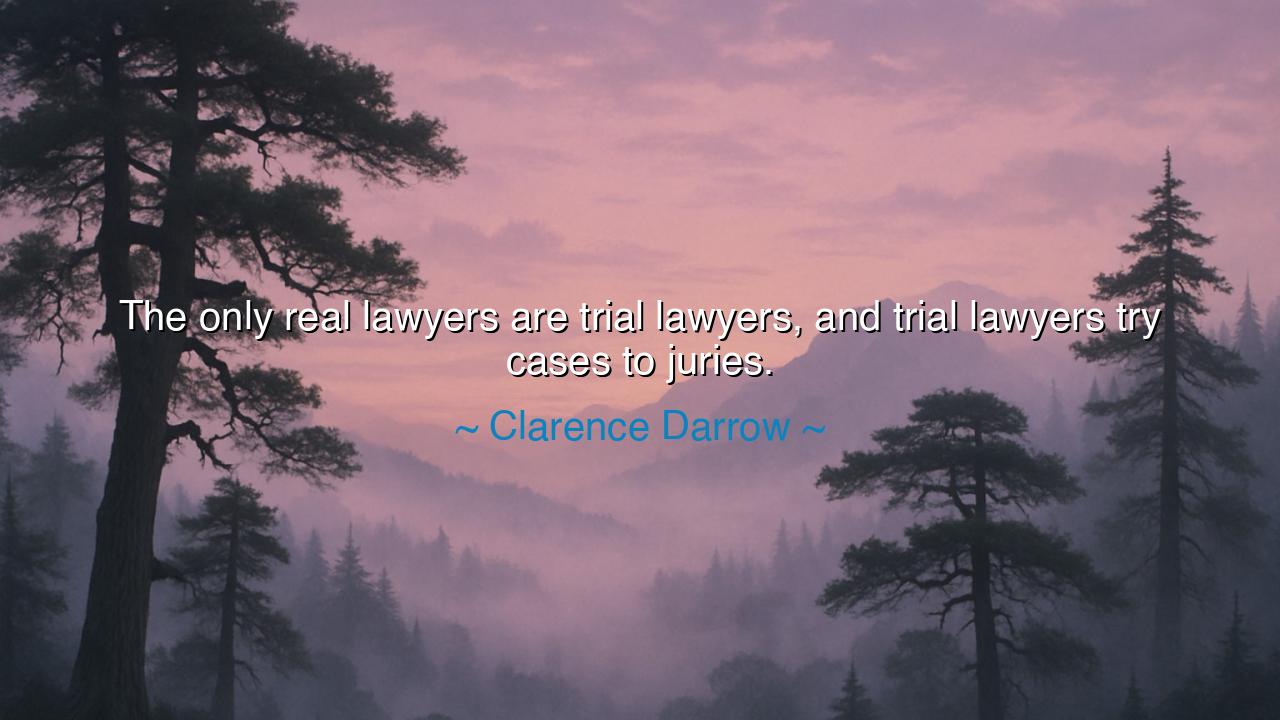
The only real lawyers are trial lawyers, and trial lawyers try






Clarence Darrow, master of the courtroom and defender of the downtrodden, once declared: “The only real lawyers are trial lawyers, and trial lawyers try cases to juries.” In these words, there is both fire and truth. Darrow speaks not of parchment nor of theory, but of the battlefield where justice is tested before the eyes of the people. He lifts high the figure of the trial lawyer, who stands exposed, unshielded by books or hidden chambers, arguing in the open arena where freedom and fate are decided.
The meaning of Darrow’s saying lies in the exaltation of courage. To be a lawyer in the truest sense, he insists, is not merely to draft contracts or advise in shadows, but to stand before a jury—a body of one’s peers—and to persuade them by reason, by passion, by truth. For here, the law is not theory but life, and words are not mere ink but swords and shields in the struggle for liberty. The trial lawyer embodies the very spirit of advocacy: the willingness to place one’s skill, one’s wits, and even one’s soul upon the scales of judgment.
The origin of this quote is tied to Darrow’s own career, which unfolded in some of America’s most momentous trials. Known for his defense of labor leaders, radicals, and the oppressed, Darrow earned his fame not in quiet offices but in crowded courtrooms, where the sweat of men mingled with the suspense of verdicts. He stood not for the comfortable, but for those whose very lives trembled in the balance. His declaration is both personal and universal: personal, because he lived the creed himself; universal, because he proclaimed the courtroom as the true forge of law.
Consider, for example, the Scopes “Monkey” Trial of 1925, where Darrow faced William Jennings Bryan in a battle over the teaching of evolution. In that crucible, Darrow did not merely argue statutes—he fought for the soul of knowledge, for freedom against dogma, for reason itself. Before the gaze of the public and the ears of the jury, his words became more than argument: they became a plea for the future. Though the verdict did not favor his client, history remembers Darrow’s stand as a triumph of courage, a testimony that the trial lawyer’s role is not only to win but to bear witness to truth.
There is a heroic quality in Darrow’s view. The trial lawyer is like the warrior of old, tested not in practice but in combat, where victory or defeat comes swiftly and all can see the outcome. To argue before a jury is to step into the arena of the people, to speak to their minds, their fears, their hopes, and to trust that justice, however flawed, will emerge from their verdict. In this way, Darrow elevates the trial above all other forms of legal work—it is where the law lives, breathes, and reveals its true nature.
Yet there is also a warning in his words. For to be a trial lawyer is not merely to seek glory, but to shoulder a burden. Lives hang on the words spoken, freedom trembles on the edge of persuasion, and the line between justice and injustice is fragile as glass. Those who step into this role must do so not for vanity, but for the sacred duty of advocacy. For the jury is not only twelve strangers—it is the embodiment of the people, the conscience of a nation.
To those who hear this teaching, the lesson is clear: true courage requires exposure. To live fully is not to hide behind certainty, but to step into the arena of risk, where your words, your deeds, your convictions are laid bare before others. Whether in law, in art, or in daily life, the truest work is done not in secret but in the open, where accountability sharpens action. Thus, the spirit of the trial lawyer is a spirit for all: dare to speak, dare to stand, dare to let your cause be tested in the light.
And so we may act: speak with integrity, seek justice even when the crowd resists, and never shrink from the trials that test your soul. For as Darrow taught, the essence of being “real” lies in stepping forth, unafraid, into the arena of judgment. There, before the jury of life, you prove not only your cause—but the very fiber of who you are.






AAdministratorAdministrator
Welcome, honored guests. Please leave a comment, we will respond soon